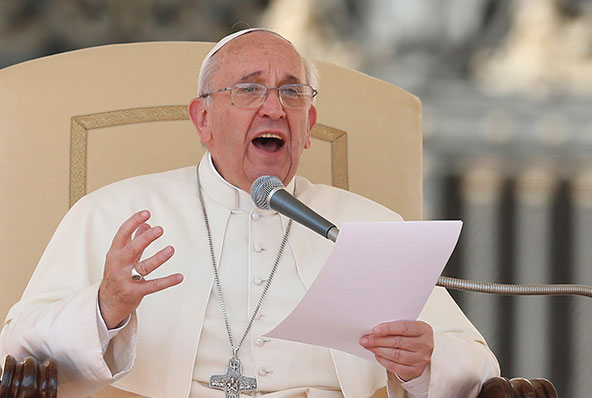

You know those emails that insist you “must” click on this link, view that video or delve into such-and-such a blog? Honestly, I end up deleting most of them. It’s just too much. Every now and then though — perhaps at my guardian angel’s prompting — I click.
Recently, a woman I know sent me an email that sparked my interest: “If this doesn’t raise goose bumps, then better check to see if you still fog a mirror.” It’s been quite a week, so I decided to check it out.

The video features the singing performance of three young men on the program “America’s Got Talent.” I was expecting some kind of pop tune, perhaps even rap. Instead, they broke into a stunning rendition of “Pie Jesu,” that is, “Merciful Jesus.”
As soon as they opened their mouths and began to sing, I burst into tears. Such beauty, such love, such poetry! The human heart yearns for this kind of love and beauty that reaches past our defenses, our objections, our excuses and failures and touches us on a profound level.
And this, I think, is a bit of what Pope Francis was alluding to in his now famous interview in America Magazine that captured worldwide attention. “The ministers of the Gospel must be people who can warm the hearts of the people, who walk through the dark night with them, who know how to dialogue and to descend themselves into their people’s night, into the darkness, but without getting lost,” Pope Francis said. The human heart is wounded, and we need the mercy and the love of God. The Church is a field hospital for the wounded, the pope said.
Do we need doctrine? Of course. Pope Francis isn’t saying that we don’t. We need apologetics and clarity on moral issues — that goes without saying. The Church’s teaching on issues like the sanctity of human life and human sexuality are not going to change, ever. But what the human heart is longing for is love, the kind of love that kisses the leper’s wounds and thereby heals them.
Meeting people where they are
Pope Francis reminds us that the Church needs to meet people right where they are — in the midst of their brokenness and sin, their addictions, the wreckage of their past, their messy lives — and embrace them with the Father’s unshakeable love. The personal experience of that kind of love is what opens people’s hearts to the truth and the willingness to surrender their lives to God completely.
We believe that God is love and if we understand how lavishly He loves us, how tenderly forgives us over and over again, then we have a joy and a peace we want to share with others. We feel that burning desire to serve, to tell others of God’s goodness and mercy. We want to sing about it!
And that — not debates, not polemics, not cultural warfare — is what will bring about conversions.
I received another email this week from a young man who has been away from the Church for many years. He’s read the Koran and delved into Buddhism, dabbled in drugs, tried to do things his own way and come up empty, still searching for love, still searching for beauty and peace. Like millions of other non-believers, he’s fascinated by Pope Francis, not because he thinks he will change the teachings of the Church — though doubtless there are some who hope he may — but because of the pope’s well-expressed, overwhelming love for humanity, of the need for mercy.
So far, I’ve had a few fallen-away Catholics strike up conversations regarding Pope Francis. They seem genuinely touched. Our pontiff has captured the world’s imagination and opened a dialogue with the disaffected, with those who don’t believe and those who never believed.
Every serious Catholic ought to read the interview and try to absorb its meaning. Our prodigal world is lost and the Father has come searching for us, eager to welcome us home. Will we help Him seek out the lost and heal the brokenhearted? Or will we remain fixated on arguments? That is the question that lies before us.





